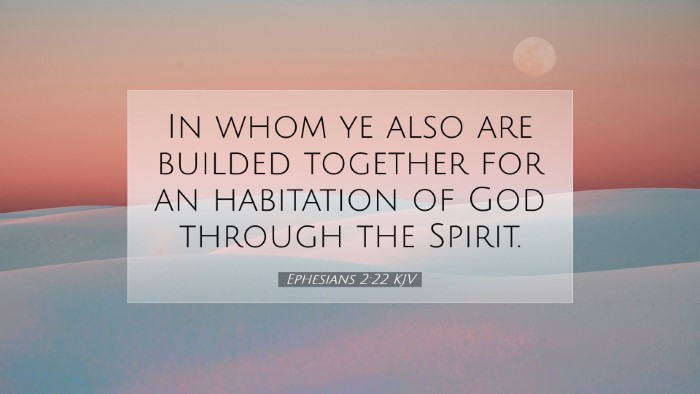Ephesians 2:22 - A Commentary
"In whom ye also are builded together for an habitation of God through the Spirit." (Ephesians 2:22)
This verse contains rich theological implications regarding the nature of the church and the indwelling presence of God. It emphasizes unity, community, and the divine purpose of believers as a collective body.
Contextual Overview
The Apostle Paul, writing to the Ephesian church, highlights the transition from the old, divided way of life to the unity found in Christ. This passage follows a description of the believers’ previous state of alienation and sinfulness (Ephesians 2:1-3) and contrasts it with their new identity in Christ (Ephesians 2:4-10).
Key Themes
- Unity in Christ: Paul emphasizes that all believers, both Jew and Gentile, are united in Christ, establishing a new humanity.
- The Church as a Spiritual House: The concept of being "builded together" introduces the church as a living temple where God dwells.
- The Role of the Holy Spirit: The phrase "through the Spirit" underlines the significance of the Holy Spirit in the believer’s communal life and spiritual formation.
Commentary Insights
Matthew Henry's Perspective
Matthew Henry remarks on the significance of being "builded together." He notes that the believers are not merely individual stones but are collectively formed into a spiritual house which becomes the dwelling place of God. The transformation from strangers to fellow citizens (Ephesians 2:19) signifies the communal nature of salvation, emphasizing that every Christian has a role in this divine building.
Albert Barnes' Observations
Albert Barnes elaborates on the phrase "for an habitation of God." He stresses that this indicates a sacred space where God's presence resides. In the Old Testament, God manifested His glory in the Tabernacle and the Temple, but now, in the New Testament, God chooses to dwell within the church composed of His people. This shifts the understanding of worship and divine presence, showing that God's habitation is no longer confined to a physical location but exists among believers.
Adam Clarke's Interpretation
Adam Clarke focuses on the importance of being "builded together." He describes this as an act of divine construction where the Church is formed through the work of the Spirit. Clarke posits that such a dwelling is characterized by harmony, love, and mutual edification among members. The individual believer contributes to the overall strength and effectiveness of the whole body, underscoring the necessity of every member's involvement for the completion of God’s work.
Theological Implications
This verse invites deep reflection on the nature of the church and the communal aspect of faith. It communicates several important theological truths:
- The Indwelling of God: God’s presence amongst His people is a profound mystery and privilege, reflecting His desire for relationship and fellowship.
- Collective Identity: Salvation is not an isolated experience but an integration into a larger community—reflecting the body of Christ (1 Corinthians 12:12-27).
- Holy Spirit’s Work: The Holy Spirit is actively involved in unifying believers, enriching their lives, and empowering them for service.
Practical Applications for Pastors and Theologians
Understanding Ephesians 2:22 can significantly influence pastoral ministry and theological teaching:
- Encouraging Community: Pastors should promote the importance of fellowship and unity among church members, recognizing that individual spirituality is interconnected with corporate identity.
- Spiritual Growth: Teaching about collaborative growth in faith can inspire congregations to engage in mutual edification, ensuring that believers uplift one another.
- Emphasizing Worship: The realization that the church itself is a dwelling place for God calls for a deeper reverence in gathering for worship and ministry.
Conclusion
Ephesians 2:22 serves as a powerful reminder of the transformative power of Christ that unites believers into a spiritual house wherein God dwells by His Spirit. The commentary insights from Matthews Henry, Albert Barnes, and Adam Clarke enhance our understanding of this verse, challenging us to live out our faith in community and to recognize the sacredness of our collective identity as the temple of God.


